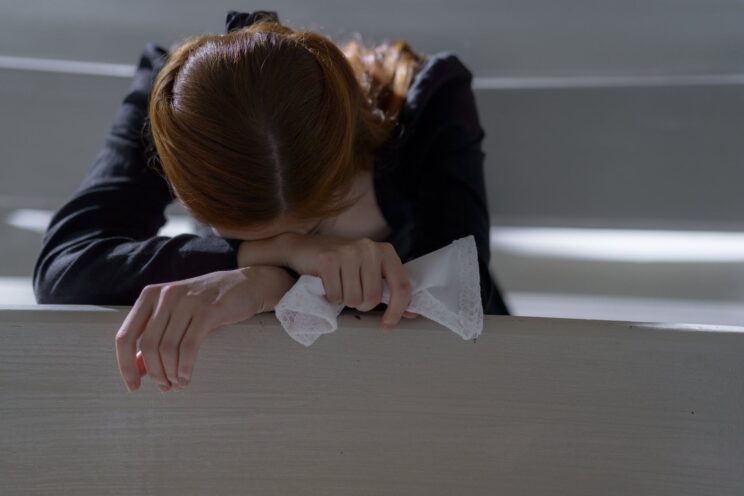
The sobering thing about Lent is that I am asked to look at and think about my sin more than I usually do. Looking closely at my sin—even looking at my sin at all—is uncomfortable. It can be upsetting to focus on my own wrongdoing.
The impulse with doing wrong is to downplay and deny that I did it. I want to pretend it never happened. Or I want to spin it so that it doesn’t seem all that bad and to play up my reasons, my very understandable rational, for why I did what I did.
What I don’t want to do is look straight at it and keep on looking.
It is very tempting to decide nothing so very terrible has happened and then to think of something else to distract myself and keep on going. But even though I try to ignore and move on, the reality is that I am probably already focusing on my sin but in some hidden, unhealthy, unrecognized ways. When I sin, I feel things like guilt and shame. I carry those around somewhere in my psyche but often I am trying to deny that I am feeling those things.
The truth is that when human beings do harm, they can’t just walk away from it as if it had never happened. It did happen and it affects us, we carry around the memory of it. It unsettles us and it makes us want to hide what we have done, even from ourselves. We are designed to feel something when we do wrong or harm. Once it is done, I am no longer free. Now I have shame. Now I carry guilt. Something has happened inside me. My relationship to myself is not the same. Everything is a little skewed.
The provision God has made for us, so that we do not stay stuck in self-deception and guilt and attempting to keep things in the dark, and which is highlighted during Lent, is, of course, Confesssion. I get beyond denying or spinning my sin. There is an invitation to come clean, to bring things out into the light. I admit my wrongdoing. And this confessing always feels like a terrible idea that is going to do me in until I do it, and then there is a wonderful relief and freedom that only comes when I stop trying to cover up or downplay the real thing that I did.
In my truest confession, I feel remorse. I have sorrow over what I did that was wrong or caused harm. My heart is softened and even broken as I look hard at my sin. I am motivated to change. I become penitent, that great Lenten word! I feel sorrow and regret. And I repent. I stop doing, saying, thinking whatever the sinful thing is and I turn in another direction.
Confession, penitence, repentance. This is how these things work. They are the keys to a freedom we don’t realize how much we long for. God wants this for us. He wants us to stop hiding, turn and be forgiven.
John writes in his epistle: If we confess our sins, he is faithful and just to forgive us our sins.
How wonderfully simple and reassuring!
In Psalm 51 David prays: Create in me a clean heart, O God, and renew a right spirit within me.
Imagine a clean heart and a right spirit. These are the gifts God has for us as we come out of the darkness and into the light.
One of the penitential psalms has this to say:
Out of the depths I cry to you, O Lord!
2 O Lord, hear my voice!
Let your ears be attentive
to the voice of my pleas for mercy!
3 If you, O Lord, should mark iniquities,
O Lord, who could stand?
4 But with you there is forgiveness,
that you may be feared.
5 I wait for the Lord, my soul waits,
and in his word I hope;
6 my soul waits for the Lord
more than watchmen for the morning,
more than watchmen for the morning.
And I realize how glad I am that the Lord does not “mark iniquities” in a way that none of us could stand but instead the Lord is focused on coming to us with forgiveness. Jesus said that he came not to condemn but to save and it is in penitence and confession that I realize how much I need him to come for me, help me, rescue me, forgive me—and to create a clean heart and a right spirit in me.
So, this Lenten season I will spend time reflecting on my sin, sitting in sorrow over my wrongdoing and I will wait for the Lord, more than watchmen wait for the morning, until he comes with his grace and mercy to set me free.
This is the fourth in a series of Lenten reflections. The reflections previously posted are: “Remember You Are Dust,” “Bright Sadness” and “Temptation: The Little Lie.“
Carrie Bare is married to a pastor and mother of two grown sons. Though she is permanently based in Spokane, Washington, she is currently dividing her time between Spokane and Boulder. Carrie has been with InterVarsity Christian Fellowship since 1975, currently serving as a spiritual director, while also serving on the Faculty Ministry Team and as chaplain to the national leadership team for Grad Student and Faculty Ministry in Inter Varsity. She has always loved reading, especially fiction.

Leave a Reply